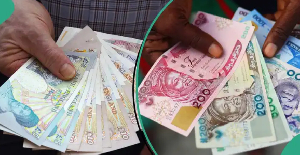Nigerian striker Victor Osimhen has opened up on what he described as the turning point of his life and career.
The 26-year-old hails from Olusosun, a remote community in Nigeria's commercial capital, Lagos, where he started playing football on the streets.
His career breakthrough came during the 2015 U-17 FIFA World Cup in Chile, where he netted 10 goals to win the Golden Boot Award and guided Nigeria to victory in the tournament.
Sharing his story of rising to stardom from obscurity, the former African Footballer of the Year stated that he was initially informed to attend the U-17 trials ahead of the WAFU B tournament in Togo, where he first met Emmanuel Amunike.
The Napoli striker noted that he didn’t get a chance to take part in the trials on the first day in Lagos and later had to travel to Abuja for the next round of trials.
Osimhen added that he had just fifteen minutes to justify his inclusion in Abuja—a chance he seized with aplomb, scoring two goals during that brief window.
His heroics caught the eye of Amunike, who called him out while he was on the verge of returning to Lagos after the trials.
“On the third day, which was the final day, we were given 15 minutes to show what we could do. It was tiring and exhausting because of the sun,” the Super Eagles striker told Daddy Freeze in an exclusive interview.
“I scored two goals in that 15 minutes, and we were told to go. I was happy it was all over, and I would be going back to Lagos. But I heard, ‘that guy in green,’ and that was me.”
“He [Amunike] told me to go and sit down. That call—‘come back’—was the turning point in my life. That was how I started this thing called a career.”
After an excellent campaign at the U-17 World Cup, Osimhen was signed by German Bundesliga outfit VfL Wolfsburg but struggled to make any impact.
Young Osimhen was later loaned out to Royal Charleroi in the Belgian Jupiler League, where he impressed and was subsequently signed by Lille in France’s Ligue 1.
Following a remarkable campaign with Lille, Osimhen was signed by Napoli in the summer of 2020 for an African record fee of €81 million—and the rest is history.
WDN
Sports News of Wednesday, 2 July 2025
Source: www.mynigeria.com













